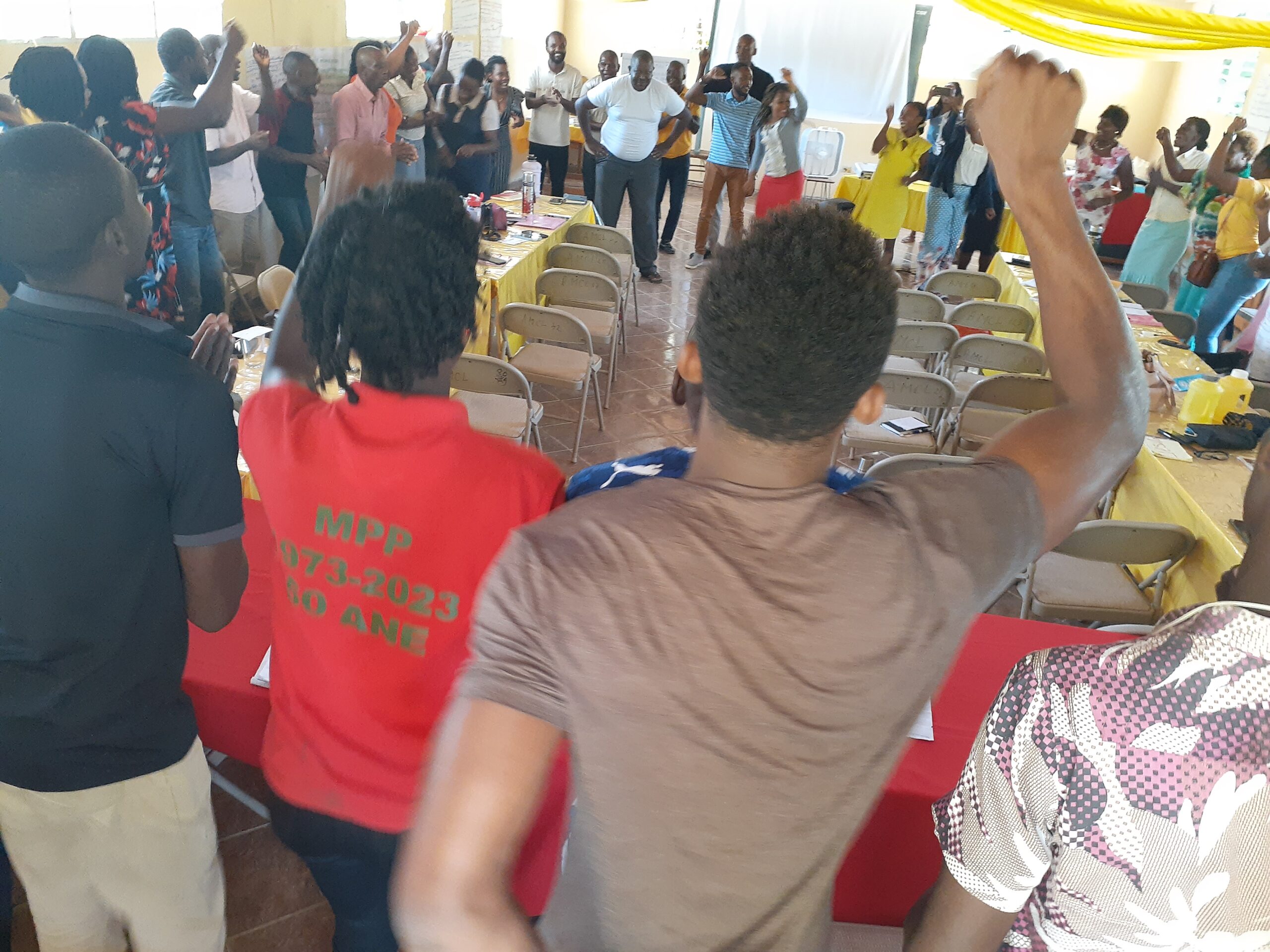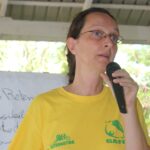Minds of the Movement
An ICNC blog on the people and power of civil resistance
by Virginie PochonMarch 27, 2025
I'm sitting by the window in my office, in front of my computer. The chirping of birds and the backfire of a motorcycle are not enough to cover the explosions of heavy weapons nearby, up in the hills above Kenscoff, in Obléon, less than 5 kilometers away. The armed gangs launched their first attack on Kenscoff on January 27, 2025, in the Belot area. There, they massacred farmers and burned down their homes. The bodies are rotting on the spot or being used as food for stray dogs. I'm sure I know some of the victims, as I've travelled through this area many times. I've lived in Kenscoff for 15 years, since the earthquake of January 12, 2010.

National meeting of the Espace national d'organisations de la société civile en Haïti (2024). Credit: GAFE.
Faced with this kind of situation here in Haiti, my feelings oscillate between helplessness, cowardice and imposture. But in the end, the cowards are those who prey on the weakest. They are the bandits and their accomplices who are simply executing a plan for the systematic annihilation of a people's humanity.
Since Christopher Columbus landed in 1492, Haiti has been subjected to the brutal assaults of the neoliberal system on human beings and nature in all its perversity and sordidness, in a tiny area of less than 30,000 square km: genocide of the Taïnos, slavery, the Code Noir, the ransom of Independence, racial domination, environmental destruction, forced labor, exploitation of natural resources, etc. These are just a few of the many ways in which the neoliberal system has been at work in Haiti.
Over the past few decades, institutional decay has set in, and the assassination of President Jovenel Moïse on July 7, 2021, revealed the foul-smelling molasses of Haitian politics and international diplomacy.
In 2024, the United Nations Human Rights Office recorded at least 5,601 people killed by armed gangs and more than 700,000 internally displaced people (approximately 6% of the population).
The climate movement and citizen empowerment

Village Alternatiba in Cité-Soleil (2017). Credit: GAFE.
But while some persist in humiliating, martyring and dehumanizing the Haitian people under the guise of humanitarian aid or development, and coveting their natural resources, Haitian citizens and civil society organizations are organizing and preparing for the ecological and social transition in the region. Among these organizations is the Francophone Action Group for the Environment (GAFE), which we, three founding members, created in 2003 with the mission of raising Haitians' civic awareness through popular citizenship education and the building of a protest-driven civil society. This is to sharpen critical thinking and empower Haitians.
In 2015, GAFE was invited to participate in the Village of Alternatives in Paris during COP 21. Since then, it has led the national citizen climate movement, Alternatiba Haiti, which brings together 37 local groups campaigning for climate justice. Five Villages of Alternatives have been organized in Haiti to promote local climate and environmental initiatives. The next Village will take place in Ouanaminthe, in the Northeast, in September 2025, focusing on the cross-border theme of extractivism, which threatens the region's ecosystems and communities.
Alternatiba Haiti also pressures policymakers for a total, definitive and unconditional ban on single-use expanded polystyrene food containers. In 2019, the movement declared July 10th a National Day of Citizen Mobilization Against Styrofoam and demanded enforcement of the decree banning these products in Haiti. Each year, local groups lead collective citizen actions in their territories to denounce the inaction of public authorities and raise awareness of the risks to health and the environment.
Reviving our humanity
Furthermore, with the creation of the National Space for Civil Society Organizations Advocating in Haiti, GAFE brings together some 50 organizations committed to carrying the pact for ecological and social transition into the next elections to foster the emergence of a new political class. This deadline is crucial for democracy. The Pact advocates for full citizen participation in defining public policies that will protect the commons and life in all its forms. On our very small scale, our greatest victory is to mobilize more and more citizens, to open the eyes and hearts of Haitians to radical societal change.
Furthermore, I am certainly an idealist (and I think one must be to lead the fight!), but I remain convinced that to revive the humanity in each of us and confront an ever more aggressive system of domination that relies on terror, withdrawal, individualism and the standardization of thought, we must also conduct an intellectual and emotional reeducation on beauty, like Elisée Reclus calls for, so as not to sink into torpor and resignation.
Thus, our struggle is political and ideological. Our hope lies in the solidarity of individuals and peoples by thwarting all strategies of division. The eyes of Haitians are opening, their minds clouded by lies and corruption are awakening. The (re)awakening of citizenship is inevitable; I and GAFE are proud to contribute to this.

Virginie Pochon
Virginie Pochon is French. She has lived in Haiti for over 24 years. She is a founding member and project manager of the Groupe d’Action Francophone pour l’Environnement (GAFE), a Haitian organization campaigning for climate justice.
Virginie Pochon est française. Elle vit en Haïti depuis plus de 24 ans. Elle est membre fondatrice et cheffe de projet du Groupe d’Action Francophone pour l’Environnement (GAFE), une organisation haïtienne qui milite pour la justice climatique.
Read More